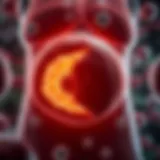Exploring Physics Careers in Washington, D.C.


Intro
The field of physics offers myriad career opportunities, particularly in a hub like Washington, D.C. This city is home to various government agencies, private industries, and academic institutions, making it an appealing destination for physicists. The blend of opportunities provides a dynamic environment for job seekers.
Many look towards D.C. not only for the roles available but also for the type of work they entail. High-caliber research institutions and renowned organizations, such as NASA and the Department of Energy, amplify the potential for physicists to make impactful contributions.
In this exploration, we will outline the relevant job market, the employers leading the way, essential skills required, and effective strategies for navigating this competitive landscape. Understanding these aspects is crucial, especially for students, researchers, educators, and professionals entering or progressing within the realm of physics.
Prologue to Physics Careers in Washington, D.C.
The diverse array of physics careers in Washington, D.C. reflects the region's unique status as a center for governmental and scientific activity. Understanding this landscape is vital for students, researchers, and professionals aiming to build their careers in physics or allied fields. The multifaceted nature of the job market, combined with the concentration of federal agencies, educational institutions, and research organizations, creates a dynamic environment for physicists seeking various roles.
Overview of the Physics Job Market
The job market for physicists in Washington, D.C. encompasses a range of sectors, including government research positions, private companies, and academic roles. Federal agencies, such as the National Aeronautics and Space Administration (NASA) and the National Institutes of Health (NIH), play pivotal roles in hiring physicists for both research and operational tasks. In addition, there are opportunities within private organizations that seek to apply physics in practical scenarios, such as technology development and consulting services. The proliferation of research institutions and universities also offers fellows and faculty positions that contribute to scientific knowledge.
In terms of demand, the job market is generally stable. However, it is crucial for candidates to stay alert to changes regarding funding and policy decisions that could affect job availability. Networking within organizations and attending conferences can yield valuable information about upcoming opportunities. This is especially important given that many positions are filled through referrals over formal applications.
Importance of Washington, D.C. in the Scientific Community
Washington, D.C. holds a significant place in the scientific community for several reasons. First, the city is home to numerous government agencies that influence both national and international science policy. Agencies like the Department of Energy and the Environmental Protection Agency often recruit physicists to help inform their decisions. Their roles often involve critical research that shapes public policy and funding allocations.
Second, the presence of major universities such as George Washington University and Georgetown University enhances collaboration in research. These institutions frequently partner with government and private sector entities for projects. The collaboration enriches the educational experience and provides students and early-career physicists with practical exposure to high-impact research projects.
Moreover, scientific dialogues often take place in D.C. due to its political environment. Forum events, symposiums, and panel discussions are regularly held, providing platforms for sharing advancements and discussing challenges in the field of physics. Such opportunities are crucial for building connections and staying current with innovations.
Types of Physics Jobs Available
The realm of physics jobs in Washington, D.C. is diverse and multifaceted. Understanding the types of available positions is crucial for anyone aiming to forge a career in this vibrant job market. Each path presents different avenues for employment, each with its own set of advantages and challenges. Whether one is drawn to the stability of government work or the dynamic nature of the private sector, knowing the potential options allows candidates to target their job search more effectively. Moreover, this knowledge empowers educators and students to tailor their studies and skill development toward the types of jobs that align with their career aspirations.
Government Research Positions
Government research positions represent a prominent category of employment in the Washington, D.C. area. These roles commonly exist within agencies like the National Aeronautics and Space Administration (NASA) and the Department of Energy (DOE). Jobs can range from theoretical physics to applied research in various scientific domains. The advantages of such positions include job stability, competitive salaries, and the potential to work on projects that drive national policy and scientific advancement.
In government roles, physicists engage in groundbreaking research that often influences critical areas such as energy policy, defense technology, and environmental science. However, applicants must navigate complex application procedures, which may include security clearances and lengthy hiring processes. Generally, these positions require at least a master's degree, with many roles needing a Ph.D.
Private Sector Opportunities
The private sector also presents rich possibilities for physicists in Washington, D.C. Companies such as Lockheed Martin and Boeing often seek individuals with strong analytical and quantitative skills. These organizations typically focus on the application of physics in technology and product development, ranging from aerospace to telecommunications.
Jobs in private companies can offer higher salaries compared to government positions and the chance to work in fast-paced environments where practical applications of physics are prioritized. However, physicists may find that workloads can be heavier, and project timelines are often tighter than in government roles. Networking and industry-specific knowledge are essential for securing these positions.
Academic Roles and Research Fellowships
Academic jobs in Washington, D.C., including positions at institutions like George Washington University and Howard University, focus on teaching and research. These roles may involve lecturing, supervising graduate students, and conducting independent research funded by grants. The academic path often supports personal exploration in specific areas of interest, which is appealing to many physicists.
Acquiring an academic position usually requires a Ph.D. and a strong publication record. While these roles offer intellectual freedom, they also come with challenges, such as securing funding for research and the pressure of tenure tracks. The environment can be highly competitive, yet those passionate about education and mentoring may find these positions deeply rewarding.
Consulting and Applied Physics Roles


Consulting roles exist at the intersection of industry and practical applications of physics. Consulting firms like Booz Allen Hamilton often hire physicists to solve complex problems for commercial and governmental clients. The work can involve data analysis, risk assessment, and developing innovative technological solutions.
Physicists in consulting roles tend to experience varied projects and travel opportunities, which can add excitement to their careers. However, these positions may also demand long hours and significant adaptability to new environments and challenges. Ideal candidates typically possess a mix of strong technical skills and excellent communication abilities, as client interactions are a key aspect of the job.
Key Employers in the Washington, D.C. Area
The job market for physicists in Washington, D.C. is diverse and rich due to the presence of various key employers. Understanding these organizations is essential for anyone looking to advance their career in physics. Each employer brings unique opportunities, resources, and professional networks. This section will explore the main categories of key employers in the region, namely federal agencies and laboratories, private research institutions, and universities.
Federal Agencies and Laboratories
Federal agencies are perhaps the most significant employers for physicists in Washington, D.C. Agencies such as the National Aeronautics and Space Administration (NASA) and the Department of Energy (DOE) employ numerous physicists for various research initiatives. These roles often focus on fundamental research as well as applied physics relevant to national interests. Contributions made in these federal settings often lead to impactful scientific advancements.
Laboratories such as the National Institute of Standards and Technology (NIST) work on improving measurement standards, which is fundamental in many scientific fields, including physics. This connection to national and global standards positions physicists in these roles as critical contributors to scientific integrity and progress. The potential for collaboration with other scientists, research opportunities, and access to cutting-edge technology can make these positions very attractive.
Private Research Institutions
Private research institutions in Washington, D.C. also play a role in employing physicists, particularly in fields related to defense and advanced technology. Organizations such as the American Institute of Physics (AIP) and various private laboratories provide physicists with resources to conduct vital research. These institutions may focus on areas such as materials science, nanotechnology, or computational physics.
The competitive landscape of private research can offer unique benefits. These roles can provide salary advantages and sometimes allow for more innovative research projects when compared to traditional academia. Engaging in these settings can foster an environment that prioritizes rapidly applied research, which is often more aligned with commercial interests.
Universities and Educational Institutions
In Washington, D.C., universities such as George Washington University, Georgetown University, and Howard University are major employers. These institutions host a variety of physics programs and departments, leading to numerous academic roles and research opportunities. Teaching and researching in such environments not only allow physicists to engage in their area of study but also contribute towards educating the next generation of physicists.
Researchers at these universities often collaborate with federal agencies and private sectors, creating an interdisciplinary approach to real-world problems. This relationship helps to apply theoretical knowledge practically, facilitating discoveries that can have broad societal implications. Furthermore, careers in academia can involve mentoring students, which is a rewarding aspect that reinforces the physics community as a whole.
"The convergence of academic curiosity and applied research in D.C. creates a vibrant ecosystem of innovation."
Skills and Qualifications for Physics Jobs
In the competitive job market for physicists in Washington, D.C., possessing the right skills and qualifications is crucial for securing desirable positions. This section will explore the specific qualifications that employers look for in candidates, the technical skills fundamental to success in various physics roles, and the soft skills that can set a candidate apart. Understanding these elements can make a significant difference for individuals seeking careers in this field.
Essential Qualifications
A solid educational foundation is often a prerequisite for careers in physics. Most jobs require at least a bachelor’s degree in physics or a closely related field. However, many positions, particularly those in research or academia, necessitate advanced degrees such as a master's or Ph.D. This higher level of education provides deeper knowledge and opens up more opportunities for specialized roles.
In addition to formal education, certifications may enhance your qualifications. For example, certifications from the American Association of Physics Teachers (AAPT) or the American Physical Society (APS) can demonstrate a commitment to the profession and an adherence to industry standards.
"Employers highly value candidates with advanced education and relevant certifications, as they reflect dedication and expertise in the field of physics."
Technical Skills Required
Technical skills are essential for physicists. These skills vary by job specialization but commonly include proficiency in:
- Mathematics: A strong command of calculus, linear algebra, and statistics is vital. These skills help physicists to model and analyze physical systems effectively.
- Programming: Familiarity with programming languages such as Python, C++, or MATLAB is increasingly important. Many physics roles involve data analysis and simulation, which require coding skills.
- Laboratory Techniques: Hands-on experience with laboratory equipment and experimental methods is critical in many positions, particularly in research environments.
Additionally, understanding emerging technologies like machine learning and quantum computing can give candidates an added advantage in the job market.
Soft Skills for Success
Beyond technical capabilities, soft skills play a crucial role in a physicist's career. These include:


- Communication: The ability to convey complex scientific concepts clearly and understandably is essential, especially when working in interdisciplinary teams or presenting findings.
- Problem-Solving: Physics often involves tackling complex problems. Employers look for candidates who can critically analyze situations and devise effective solutions.
- Collaboration: Many physics jobs require working closely with colleagues or other departments. Being able to work effectively in teams fosters innovation and enhances project outcomes.
In summary, combining essential qualifications with technical and soft skills creates a robust candidate profile for physics jobs in Washington, D.C. Candidates should focus on developing these areas to improve job prospects in a competitive market.
Challenges in the Physics Job Market
The field of physics offers many job opportunities, yet it is not without challenges. Understanding these challenges is crucial for anyone looking to pursue a career in this area. In Washington, D.C., the complexity of the job market can be especially pronounced. Knowing what lies ahead can help candidates navigate their career paths with greater success.
Competition for Positions
One of the primary challenges in the physics job market is the competition for positions. Washington, D.C. attracts a large number of highly qualified physicists due to its wealth of research institutions, federal agencies, and private companies. Each year, many new graduates with advanced degrees enter this market, intensifying competition.
Given the limited number of openings in sought-after roles, applicants must present themselves exceptionally. This means not only having a solid educational background but also standing out through internships, research projects, or published work. Networking plays a vital role here. Participating in conferences and engaging with professionals can create connections leading to job opportunities.
Navigating Federal Employment Processes
Working in federal agencies is a common goal for many physicists. However, applying for these positions can be complex and daunting. The federal hiring process often involves multiple steps, including extensive background checks and several rounds of interviews. Understanding these processes is critical.
Many candidates may find the USAJOBS portal helpful. It offers valuable resources for navigating federal job listings. Staying organized and prepared can significantly improve the chances of securing a position. Additionally, knowing how to tailor applications to meet the specific requirements of federal jobs is essential.
Balancing Research and Application Jobs
Physicists often face the challenge of balancing research roles with applied positions. Those who prefer theoretical physics might find academic jobs appealing, yet these roles can be increasingly competitive. On the other hand, positions in applied physics focus on real-world applications and may offer more openings.
Job seekers should assess their interests and skills to make a well-informed choice. Those leaning towards research should consider pursuing grants or collaborations that can enhance their research output. Conversely, professionals aiming for applied roles may need to refine their technical skills or adapt their approaches to align with industry demands.
"Understanding the challenges you face in the job market will prepare you to tackle them head-on, increasing your chances for success."
Overall, while the physics job market in Washington, D.C. is competitive and complex, with informed strategies, candidates can position themselves favorably.
Job Search Strategies for Physicists
In the competitive landscape of physics jobs in Washington, D.C., effective job search strategies are essential for aspiring physicists. A deep understanding of available resources and methods can greatly improve the chances of landing desirable positions. This section covers key strategies that physicists should consider, including the power of networking, leveraging online job portals, and preparing effectively for interviews. Each of these areas plays a crucial role in ensuring that candidates can navigate the physics job market successfully.
Networking within the Scientific Community
Networking is vital for physicists seeking job opportunities in Washington, D.C. The scientific community is interconnected and relies heavily on personal relationships. Engaging with peers and industry leaders can reveal hidden job openings and provide insights about organizations.
- Attend conferences, seminars, and workshops focused on physics.
- Join professional organizations such as the American Physical Society or similar groups.
- Participate in local meetups or university alumni events.
A strong network can lead to referrals, which are often more effective than traditional applications. You should consider reaching out to professors, former colleagues, and even current employees in organizations you are interested in. Engaging in meaningful discussions can help in making connections that may lead to job opportunities.
Utilizing Job Portals and Resources
The digital age offers various job portals where physicists can find relevant employment opportunities. Websites like LinkedIn, Indeed, and Glassdoor hold a wealth of job postings tailored to science professionals. Specialized portals like Physics Today and ResearchGate focus even further on physics positions. Here are some tips for utilizing these platforms:
- Filter job searches based on location, salary, and type of employment.
- Set up notifications for new job postings in your areas of interest.
- Use keywords effectively to refine search results and attract the right openings.
In addition to job portals, consider accessing government resources like USAJOBS for federal positions. Academic institutions often have their own career websites listing available roles in research and teaching.
Interview Preparation and Tips


Once a candidate secures an interview, preparation is crucial. Interviewing for physics positions can be rigorous, often requiring both technical expertise and problem-solving abilities. Here are some strategies to enhance your interview performance:
- Research the organization thoroughly. Understand their mission, recent projects, and the specific team you aim to join.
- Practice technical questions tailored to the position. Work through problems and discuss your thought process.
- Prepare behavioral interview answers using approaches like the STAR method (Situation, Task, Action, Result). This helps in articulating past experiences clearly.
Also, consider conducting mock interviews with mentors or peers to gain confidence.
"A good first impression can set the tone for a successful interview; preparation is key."
In summary, job search strategies for physicists in Washington, D.C. encompass effective networking, utilizing appropriate job portals, and thorough interview preparation. Each strategy contributes to a more successful job hunt, making it crucial for candidates to invest time and effort in these areas.
Future Trends in Physics Employment
The field of physics is evolving rapidly, influenced by technological advancements and shifting societal needs. Understanding future trends in physics employment is vital for students, researchers, educators, and professionals. This knowledge enables individuals to align their skills and career goals with emerging opportunities in the job market.
Emerging Fields of Research
Emerging fields in physics are essential for the future of the job market. Areas such as quantum computing, renewable energy, and nanotechnology are gaining momentum. These fields often require specialized knowledge but offer innovative career paths. Below are key fields reshaping physics employment:
- Quantum Computing: This field explores quantum mechanics principles to develop new computational methods. Companies like IBM and Google are actively searching for physicists.
- Renewable Energy Technologies: Climate change concerns drive the demand for physics professionals to design efficient solar panels, wind turbines, and energy storage systems.
- Biophysics: This interdisciplinary field merges physics and biology. Researchers in biophysics examine biological systems through a physical lens, enhancing drug development and medical devices.
- Space Physics: Advancements in space exploration lead to a demand for physicists understanding cosmic phenomena and satellite technologies.
Keeping abreast of these emerging fields can position aspiring physicists to take advantage of new job opportunities.
Impact of Technology on Physics Careers
Technology significantly influences physics jobs. The integration of artificial intelligence, machine learning, and data science is becoming increasingly relevant. These technologies enhance research capabilities and open new career avenues. Here are some key impacts:
- AI and Machine Learning: Physicists can analyze large datasets more efficiently. These tools facilitate simulations and predictive models in research.
- Collaborative Platforms: Online platforms foster collaboration among physicists globally. Sharing data and research insights accelerates innovation in various physics subfields.
- Remote Work Trends: COVID-19 accelerated the acceptance of remote work in many sectors, including physics. This trend allows more flexibility for researchers and academics.
By understanding future trends and adapting accordingly, the physics community can thrive in Washington, D.C.’s job market. Individuals should actively seek training and education in emerging fields and technologies to align themselves with future opportunities.
Ending: The Path Forward
The exploration of physics jobs in Washington, D.C. reveals significant insights about the employment landscape. This section aims to synthesize key findings and encourage those interested in pursuing careers in this vibrant field. Understanding the dynamics of the job market in D.C. is critical. The region is not only the hub of government agencies but also a prominent area for academic research and private sector innovation. This unique combination offers a wealth of opportunity.
Additionally, it is crucial to recognize the essential qualifications required for these positions. Possessing a strong educational background in physics, along with relevant technical skills, enhances job prospects. Soft skills also play a vital role, as the ability to communicate complex ideas clearly can distinguish candidates in competitive job scenarios.
Furthermore, the challenges within this job market cannot be overlooked. Candidates often face intense competition and complex federal employment processes. Therefore, developing effective job search strategies is essential. Networking within the scientific community and leveraging job portals can foster connections and provide invaluable resources.
To summarize, the D.C. region supports a rich ecosystem for physics jobs, characterized by various employers, from government to private sectors. The ongoing integration of technology and emerging fields continues to shape available opportunities.
"The future of physics careers in Washington, D.C. is bright, marked by growth and innovation across various sectors."
Summarizing Key Findings
The key findings from the previous sections illustrate the multifaceted nature of physics employment in Washington, D.C. The following points summarize these findings:
- Diverse Employment Opportunities: The area offers roles in government, private, and academic sectors, suggesting a broad range of placements for job seekers.
- Essential Skills and Qualifications: A strong technical background, combined with excellent analytical and interpersonal skills, is vital.
- Challenges of the Market: Competition is a significant barrier, requiring ambitious candidates to be strategic in their job-searching efforts.
- Networking and Community Engagement: Active participation in the scientific community proves beneficial for accessing opportunities and gaining insights.
These insights serve as a roadmap for aspiring physicists, guiding their approach to finding and securing positions in this dynamic field.
Encouragement for Future Physicists
Looking ahead, there is ample reason for optimism for those entering the field of physics. The D.C. job market is evolving, influenced by technological advancements and interdisciplinary research. Future physicists should embrace lifelong learning and adaptability, as these traits will be crucial in navigating the changes in the job landscape.
It is also imperative to remain engaged with ongoing research and innovations in the field. Emerging areas such as quantum computing, materials science, and renewable energy are likely to drive future job demand.
Additionally, connecting with mentors and peers can provide guidance and support in this journey. The contributions of future physicists will not only advance their careers but also significantly impact society and technology. The path forward is open, rich with potential. Enthusiasm and commitment can lead to rewarding careers in physics.







